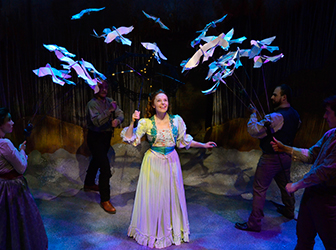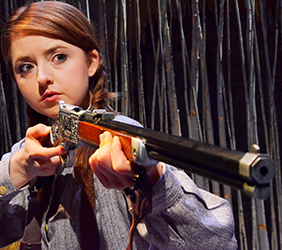From the Chicago Tribune
February 23, 2015
By Kerry Reid
★★★½
Amy Timberlake’s “One Came Home” has a distinct whiff of “True Grit” in its bones, with a dash of Ian McEwan’s “Atonement.” But in Lifeline Theatre’s world premiere adaptation by Jessica Wright Buha, the story of Georgie Burkhardt’s search in 1871 Wisconsin for her elder sister often feels tough, tender and remarkably honest about how complicated — and yet paradoxically simple — the truth can be.
As far as the small town of Placid, Wisc., is concerned, Agatha Burkhardt came home in a pine box, her mangled remains identifiable only through the blue-green ball gown she cherished. She left in a buckboard driven by “pigeoners” — hunters of the passenger pigeons that turned central Wisconsin into the largest recorded nesting ground for the birds in 1871. By 1914, of course, the species would be extinct.
The juxtaposition of the birds’ looming fate with Agatha’s doesn’t always mesh smoothly in director Elise Kauzlaric’s staging, though Alan Donahue’s bird puppets capture the distinctive size and color of the pigeon whose migrations once darkened the skies for days. But when the story focuses on Georgie’s stubborn refusal to accept Agatha’s extinction and her journey to discover the truth in the company of Agatha’s one-time beau, Billy, it hums. Buha’s narrative seamlessly weaves together the flashbacks to the days before Agatha’s disappearance with Georgie’s quest, aided greatly by John Szymanski’s stark-but-nostalgic original music, played live on guitars and percussion by the ensemble.
Ashley Darger’s Georgie is a motormouth with dead-eye aim with a gun, thanks to her grandfather’s tutelage. Her eagerness to shoot birds disturbs tender-hearted Agatha (Amanda Jane Long), who asks her “Why be rough when you can be kind?”
It’s a good question, and one of the great strengths of this production is that Darger’s Georgie, like Mattie Ross in “True Grit,” isn’t necessarily likeable, despite her obvious moxie. She’s self-righteous and quick to judge what she doesn’t understand (which is where the “Atonement” parallel comes in). Georgie not only needs to test her mettle on the open road as part of her rite of passage into adulthood — she also needs to learn that she still has a lot to learn.
Darger’s febrile take on Georgie is well balanced on her journey by Jeff Kurysz’s even-tempered but on-the-verge-of-exasperation Billy, whose own motivations aren’t always what they appear. The differences between the sisters in the flashbacks sets Long’s Agatha up as a dreamer with a pragmatic streak. “I know how to walk so no one hears me,” she tells Georgie. “I know the secret places.”
Often, those secrets are hiding in plain sight. Donahue’s rough-hewn set with its thicket of bare branches and Diane D. Fairchild’s rich color-and-shadows lighting suggest that abundance and scarcity nestle side-by-side in both nature and the human heart. One day the skies are filled with birds as far as the eye can see, but before you know it they’ve been silenced forever. “One Came Home” presents that trajectory of loss with heart and grit. Like the best young-adult stories, it’s sure to resonate far beyond the target audience and hit the hearts of those wondering just how our relationships took the turns that they did, and whether we can find our way back home.
From Time Out Chicago
February 28, 2015
By Kevin Thomas
★★★★
A quietly tragic young-adult Western about sisters. Not a sentence I ever expected to write, but with One Came Home Lifeline Theatre brings to the stage an adaptation that not only achieves its usual standard of excellence, but also, unusually for an adaptation, presents a new and unpredictable story.
Certainly that’s in part because the source material is very current. Timberlake’s novel was published in 2013 to widespread praise, and while I now wish I’d read it, I’m also glad I didn’t — Jessica Wright Buha’s adaptation would pass for an original stage play if you didn’t know better. Georgie (Ashley Darger) is a rough and practical 13-year-old in 1870s Wisconsin who loved her older sister Agatha (Amanda Jane Long), even if Georgie couldn’t understand her interests in a life beyond Placid. But something between them went wrong, Agatha ran off, and two weeks later a faceless corpse wearing her best blue dress is carted into town. Everyone accepts Agatha is dead — except Georgie, who sets out into the prairie to find either her missing sister, or a target for her gun.
Scattered memories of the past flutter in and out of focus as Georgie sets out on her quest. At first the constant flashbacks are almost annoying, in the same way that Georgie does not start as a particularly lovable protagonist — she’s all spunk with no charm. But One Came Home’s real story becomes clear as it progresses, just as the play itself becomes smoother and more captivating.
It becomes apparent that we’ve been seeing things through Georgie’s eyes, but all the fire and gumption in the world can’t cover up the naive tween’s confusion. The more mistakes she makes, and the more her journey refuses to be what she hopes, the more lovable and sympathetic she becomes. As her clichéd Western adventure fails, the curtain rolls back to reveal her ignorance and errors back home, before Agatha’s disappearance.
One Came Home opens with a tragedy, but one that our heroine hasn’t yet accepted. So we wait bated breath while Georgie explores the flowing beige-and-grey prairie set designer Alan Donahue has built for her, where the only signs of life are the birds. It’s going to come to her eventually, and that tension invests every little discovery with painful importance, and just a little bit of hope.
If anything, creating Georgie’s initially narrow worldview makes the cast’s performances reserved and distant for too long. Like the rest of the play, they come alive only when things go very wrong for Georgie, and push back against her stubborn opinions. But that’s a small flaw in a brilliant scheme. This is a piece that digs into the limited perspectives of sisters at different points in life. Georgie and Agatha loved each other very dearly, even when they fought. But each suffered from the myopia of youth, their individual pretty pictures constantly shaken when the other’s perspective nosed in. One Came Home is achingly on the mark. It tells a subtle, very accurate story about growing up that plays perfectly with the strangeness, romance, and action of its Western roots.
From the Dueling Critics
February 22, 2015
By Kelly Kleiman
HIGHLY RECOMMENDED
Lifeline’s stock in trade is stage adaptations of literature, and all the company’s strengths are on display in this world premiere version of an Edgar Award-winning and Newberry Honor novel by Amy Timberlake. We’re quickly immersed in the story of Georgie Burkhardt, a rebellious teenager in post-Civil War Wisconsin whose sharpshooting skills come in handy when she insists on following the trail of a sister everyone else believes has been murdered. As adapted by Jessica Wright Buha and directed by Lifeline stalwart Elise Kauzlaric, this is in no sense a “children’s show,” though the protagonist is a young adult. Georgie’s grief wars with her belief as her hostility to her sister’s beau turns to interest; these are all fully-rounded and fully-adult emotions, particularly as expressed by Ashley Darger, whose face changes expressions as readily as her character’s finger hits the trigger. And the overall production — including set and properties by Alan Donahue, costumes by Aly Renee Amidei and original music (folk-influenced and period-perfect) by John Szymanski — transform Lifeline’s challenging space into a world complete with fluttering pigeons, woodland refuges and happened-upon body parts. Want American history? — forget American Girl dolls; forget even “True Grit.” See One Came Home.
From stageandcinema.com
A Passion Play From Placid
February 23, 2015
By Lawrence Bommer
Like a baby on a breast, Lifeline Theatre thrives on adaptations of “coming of age” novels. Like many memory-rich predecessors, Jessica Wright Buha’s clear and present stage version of One Came Home, Amy Tinderlake’s “heroine journey” best-seller from 2013,hangs on seminal turning points. Buha efficiently establishes clear relationships among boldly drawn characters about whom you care sooner and longer than you expect. Elise Kauzlaric completes the labor of love, staging this small-town mystery thriller with tensile timing and unexcelled casting.
Saluting literal sisterhood and enriched by John Szymanski’s guitar backdrop, the story celebrates the plucky, stubborn, and resilient persistence of tomboy Georgie Burkhardt (Ashley Darger, firing on all cylinders). This turbulent teen comes from the glacially scoured, sparsely wooded fields of erroneously named Placid, Wisconsin in 1871 (the year of the deadliest fire to ever hit the state–but, strangely, that’s not in the play despite the specificity of the year). The biggest–and most lucrative–event to excite this remote settlement is the annual passenger pigeon migration. The big sky processions attract hordes of hunters, like sharpshooting Georgie. (The flocks are delightfully depicted by actors manipulating Alan Donahue’s fluttering puppets.)
But feisty Georgie’s sole concern right now is her disappeared older sister Agatha (ardent Amanda Jane Long). A redheaded, intellectually curious and independent minded, heartland lady, Agatha dreams of homesteading in Minnesota with handsome Billy (winsome Jeff Kurysz) or running off to university in Madison, where there are a lot more books than she can read in Placid. Agatha is clumsily wooed by Billy and also by hotelkeeper Mr. Olmstead (Dan Granata), the town’s magnate and owner of ornate books for Agatha to adore. Complicating the courtships is Agatha’s rival Polly (Miriam Reuter), a pioneer woman born to bust sod.
But this is all backstory, effectively told in flashbacks: Our worry is Agatha’s unexplained and uncharacteristic departure for destinations unknown. Worse, scattered body parts have been found downstate, with shreds of the blue ball gown that Agatha took with her. The town is plunged into sorrow. Agatha, as they presume her to be, is buried with fond recollections from her God-fearing grandfather (Errol McLendon) and disconsolate ma (Heather Currie).
But ever contrary Georgie won’t believe her sister is dead. She just can’t feel that much absence. She rents a mule from Billy, who refuses to let this “small fry” go alone. The unlikely twosome set off to find Agatha or her killers, wherever it takes them. Along the instructive way, the cumulatively courageous duo meet helpful strangers and “pigeoners.” The travelers slowly appreciate each other’s no longer threatening extremes–Georgie’s reflexive hunches and “big brother” Billy’s protective caution. Georgie even falls for the dashing farm boy as they become each other’s Samaritans of choice. The hunt takes them all over the Badger State. They meet all kinds, including nasty renegades called the Gowers and enter a cave that discloses more than one crime. Agatha’s fate is, of course, not to be revealed by even the slightest spoiler.
It’s enough to praise taut plotting by author and adaptor: The 150 minutes pass fairly fast, fueled by our curiosity as much as Georgie’s dogged quest. The staging, ingenious and resourceful as its source, employs tall ladders to depict horses and wooden platforms to double as coffins, counters in stores, and blocked doors.
Equally supple, Lifeline’s eight-member ensemble commit to these characters, inside and out. They’re super-served by Donahue’s wonderfully evocative Wisconsin winterscape, its rolling fogs subtly suggested by a spectral scrim and Diane Fairchild’s impressionistic lighting. Szymanski’s sound effects tell stories in their own right. Aly Renee Amidei’s equally earth-toned costumes could have stepped out of period mezzotints: Their instant nostalgia provides the best illustrations an author could wish. A good yarn grows into a great memory.























